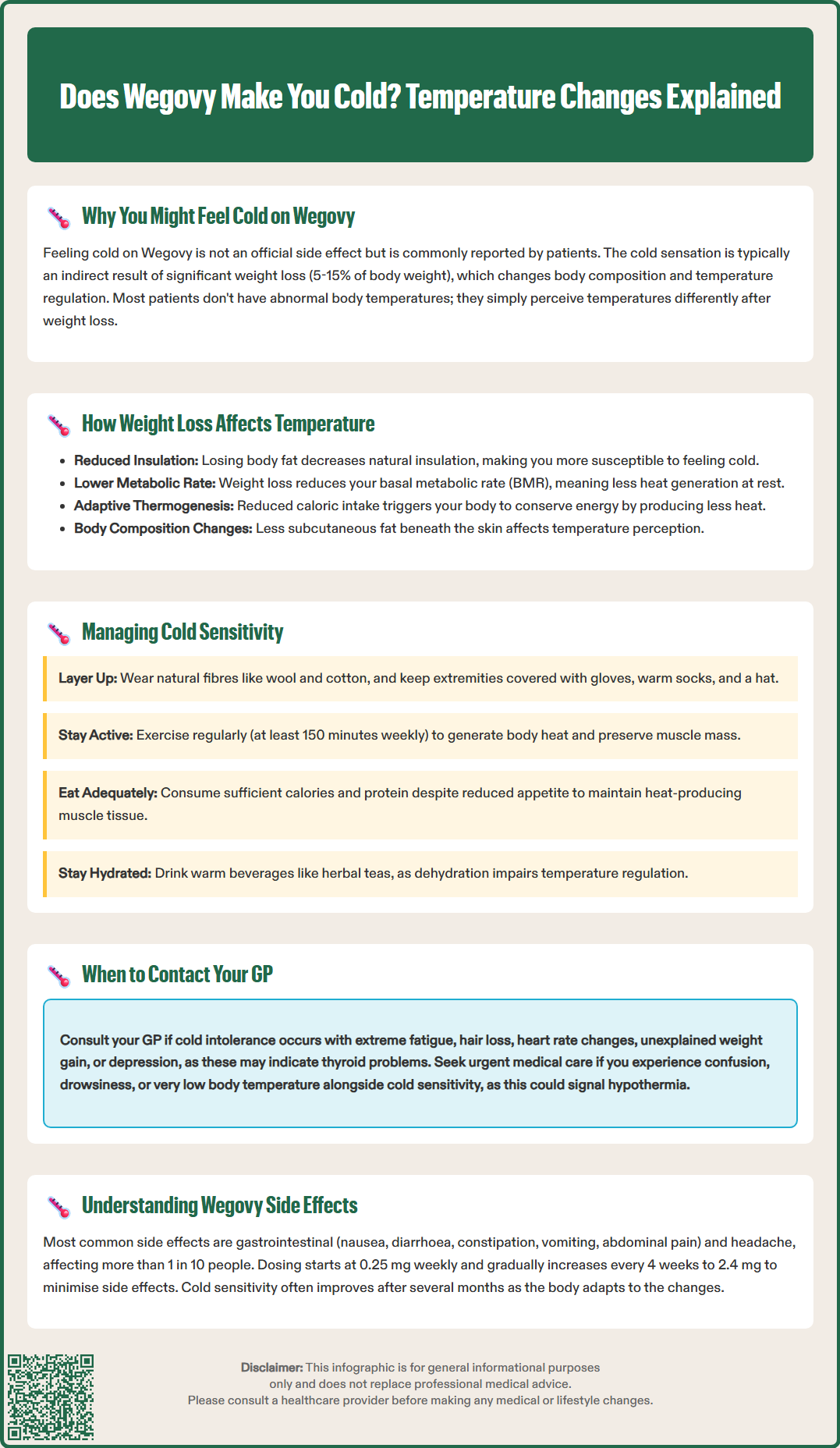
Does Wegovy make you cold? Some patients taking Wegovy (semaglutide 2.4 mg) report feeling colder than usual, particularly during initial treatment months. Whilst not listed as an official side effect in the MHRA-approved Summary of Product Characteristics, this sensation is commonly reported and typically relates to weight loss rather than direct drug action. As patients lose significant body weight—often 5–15% over several months—body composition changes affect temperature regulation. Reduced body fat decreases natural insulation, whilst lower metabolic rate produces less heat. This article examines why Wegovy may make you feel cold, when to seek medical advice, and practical management strategies.
Quick Answer: Wegovy does not directly cause coldness, but patients commonly feel colder due to weight loss reducing body fat insulation and lowering metabolic heat production.

Mounjaro® is the most innovative GLP-1 medication proven to dramatically curb appetite, hunger, and cravings to help professional men achieve substantial weight loss.
Start Here
Wegovy® is a weekly injectable GLP-1 medication with proven effectiveness in reducing appetite, hunger, and cravings to help busy professionals lose significant weight.
Start HereSome patients taking Wegovy (semaglutide 2.4 mg) report feeling colder than usual, particularly during the initial months of treatment. It's important to note that feeling cold is not listed as an official side effect in the Summary of Product Characteristics (SmPC) approved by the Medicines and Healthcare products Regulatory Agency (MHRA), and evidence for this effect is largely anecdotal from patient reports and clinical observations.
The sensation of feeling cold whilst taking Wegovy is typically an indirect effect rather than a direct pharmacological action of semaglutide itself. As patients lose significant amounts of weight—often 5-15% of their initial body weight over several months as seen in the STEP clinical trials—their body composition changes substantially. This weight loss can affect how the body regulates temperature, potentially leading to increased cold sensitivity.
It is important to distinguish between feeling cold as a consequence of weight loss and experiencing genuine hypothermia or thyroid dysfunction. Most patients who report feeling colder on Wegovy do not have abnormal body temperature readings; rather, they perceive environmental temperatures differently than before treatment. This phenomenon is generally considered a benign adaptation to weight loss rather than a cause for medical concern.
If you are experiencing persistent or severe cold intolerance alongside other symptoms such as extreme fatigue, hair loss, or unexplained changes in heart rate, it is advisable to consult your GP to rule out other underlying conditions, particularly thyroid disorders. Seek urgent medical attention if cold sensitivity is accompanied by confusion, drowsiness, or very low body temperature, which could indicate hypothermia.

Understanding why Wegovy and similar GLP-1 receptor agonists might make you feel cold requires examining the physiological changes that occur during significant weight loss. Adipose tissue (body fat) serves as insulation, helping to maintain core body temperature. As you lose substantial amounts of fat, particularly subcutaneous fat beneath the skin, your body's natural insulation decreases, making you more susceptible to feeling cold in environments that previously felt comfortable.
Additionally, weight loss is associated with a reduction in basal metabolic rate (BMR)—the number of calories your body burns at rest. When you carry less body mass, your body requires less energy to maintain basic functions, which means less heat is generated as a by-product of metabolism. Research suggests that weight loss can decrease metabolic rate, contributing to reduced heat production.
Wegovy works by mimicking the glucagon-like peptide-1 (GLP-1) hormone, which slows gastric emptying, reduces appetite, and promotes satiety, as described in the MHRA-approved SmPC. This leads to reduced caloric intake, which can further decrease thermogenesis—the process by which your body produces heat. When you consume fewer calories, your body may conserve energy by reducing heat production, a phenomenon sometimes called adaptive thermogenesis.
There is some preliminary research suggesting GLP-1 receptor agonists might influence central temperature regulation, but this remains largely theoretical. The cold sensation experienced by many patients is likely multifactorial, involving changes in body composition, metabolic rate, and possibly other mechanisms that are not yet fully understood.
Wegovy is licensed in the UK for weight management in adults with a body mass index (BMI) of 30 kg/m² or greater, or 27 kg/m² or greater with at least one weight-related comorbidity. According to the MHRA-approved SmPC, the most frequently reported side effects are gastrointestinal in nature and include:
Nausea (very common, affecting more than 1 in 10 people)
Diarrhoea (very common)
Constipation (very common)
Vomiting (very common)
Abdominal pain (very common)
Headache (very common)
Fatigue (common, affecting up to 1 in 10 people)
Dyspepsia (indigestion, common)
These gastrointestinal effects typically occur during dose escalation and often improve as the body adjusts to the medication. The SmPC recommends gradual dose titration to minimise these adverse effects, starting with 0.25 mg once weekly and increasing every 4 weeks to reach the maintenance dose of 2.4 mg.
Side effects requiring immediate medical attention include:
Severe, persistent abdominal pain which may indicate pancreatitis (seek urgent medical care)
Signs of gallbladder problems such as pain in the upper right abdomen, which can be common
Severe allergic reactions (seek emergency care)
Changes in vision, particularly in patients with diabetes
The SmPC notes that in non-clinical studies, semaglutide caused thyroid C-cell tumours in rodents; however, the relevance of this finding to humans is unknown.
Whilst feeling cold is not officially documented as a side effect, healthcare professionals should be aware that patients may report this symptom, particularly as weight loss progresses.
Patients are encouraged to report any suspected side effects to the MHRA Yellow Card Scheme (yellowcard.mhra.gov.uk).
Whilst mild cold sensitivity during weight loss treatment is generally not concerning, certain symptoms warrant medical evaluation. You should contact your GP or healthcare provider if you experience:
Persistent extreme cold intolerance that significantly affects your daily activities or quality of life
Cold sensitivity accompanied by other symptoms of hypothyroidism, such as unexplained weight gain (despite continued Wegovy use), severe fatigue, constipation, dry skin, hair loss, or depression
Shivering or inability to warm up even in heated environments
Changes in heart rate, particularly a notably slow pulse (bradycardia)
Swelling in the neck or difficulty swallowing
Any new or worsening symptoms that concern you
Your GP may wish to perform thyroid function tests (typically measuring TSH and possibly free T4) to rule out hypothyroidism if symptoms suggest this condition.
If weight loss is very rapid or you have symptoms of dehydration or malnutrition, contact your GP for assessment. NICE guidance (TA875) recommends that weight loss medications should be part of a comprehensive programme including dietary modification, increased physical activity, and behavioural support within specialist weight management services.
Seek urgent medical attention if you experience:
Severe, persistent abdominal pain (possible pancreatitis)
Signs of a serious allergic reaction (rash, swelling, difficulty breathing)
Cold sensitivity with confusion, extreme drowsiness, or very low body temperature (possible hypothermia)
It is also worth discussing cold sensitivity if it is accompanied by dizziness, fainting, or signs of dehydration, as these may indicate that your caloric intake has become too restricted or that you are experiencing significant side effects requiring dose adjustment.
If you are experiencing increased cold sensitivity whilst taking Wegovy, several practical strategies can help you maintain comfort without compromising your weight loss goals:
Dress appropriately: Layer your clothing to trap warm air close to your body. Natural fibres such as wool and cotton provide good insulation. Keep extremities warm with gloves, warm socks, and a hat, as significant heat loss occurs through the head and hands.
Maintain adequate nutrition: Ensure you are consuming sufficient calories to support your metabolic needs. Whilst Wegovy reduces appetite, it is important not to restrict calories excessively. Consider discussing your individual nutritional needs with a healthcare professional or registered dietitian, who can provide personalised advice on maintaining adequate protein intake to preserve muscle mass, which contributes to heat production.
Stay physically active: Regular exercise generates heat and helps maintain muscle mass, which is metabolically active tissue that produces heat even at rest. The UK Chief Medical Officers' guidelines recommend at least 150 minutes of moderate-intensity activity weekly for general health benefits.
Ensure proper hydration: Dehydration can impair temperature regulation. Warm beverages such as herbal teas can provide both hydration and warmth.
Monitor your environment: Keep your home at a comfortable temperature (around 18-21°C is generally recommended) and use blankets or heating pads when resting.
Consider timing: Some patients find that cold sensitivity may improve after several months as their body adapts to the new weight. If symptoms are severe, discuss with your healthcare provider whether adjustments to your treatment plan might be appropriate, following the guidance in the SmPC.
Cold sensitivity may occur during weight loss, but your comfort and overall wellbeing are important. Do not hesitate to discuss any concerns with your healthcare team, who can provide guidance specific to your situation.
Feeling cold is not listed as an official side effect in the MHRA-approved Summary of Product Characteristics for Wegovy. However, many patients report increased cold sensitivity, which is typically an indirect consequence of weight loss rather than a direct pharmacological effect of semaglutide.
Weight loss reduces subcutaneous fat, which acts as natural insulation, and lowers basal metabolic rate, meaning your body generates less heat at rest. These physiological changes make you more susceptible to feeling cold in environments that previously felt comfortable.
Contact your GP if cold sensitivity is severe, persistent, or accompanied by other symptoms such as extreme fatigue, hair loss, unexplained weight gain, slow heart rate, or difficulty warming up. These may indicate thyroid dysfunction or other conditions requiring medical evaluation.
All medical content on this blog is created based on reputable, evidence-based sources and reviewed regularly for accuracy and relevance. While we strive to keep content up to date with the latest research and clinical guidelines, it is intended for general informational purposes only.
DisclaimerThis content is not a substitute for professional medical advice, diagnosis, or treatment. Always consult a qualified healthcare professional with any medical questions or concerns. Use of the information is at your own risk, and we are not responsible for any consequences resulting from its use.